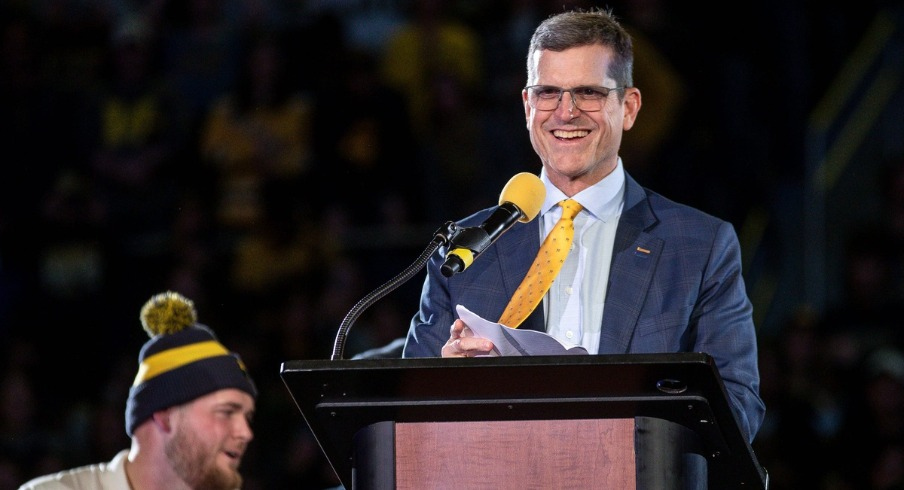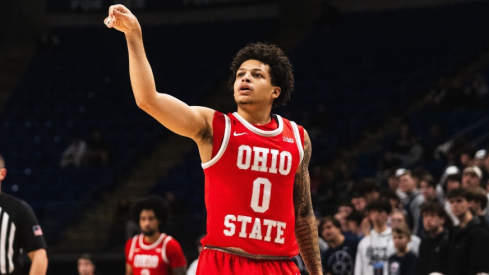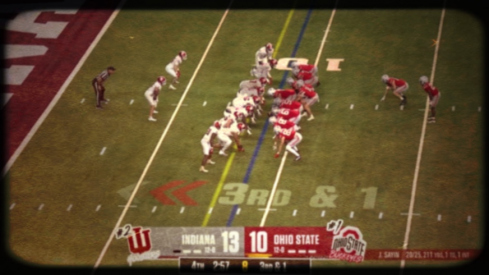If you ask most college football fans, the general consensus would be that Michigan got off easy from the NCAA on its punishment for its sign-stealing scandal.
The NCAA did ensure that Jim Harbaugh and Connor Stalions won’t return to college football any time soon, however, handing out a 10-year show cause to Harbaugh and an 8-year show cause for Stalions, who orchestrated the impermissible scouting scheme. The 10-year show-cause for Michigan’s former head coach is the second-longest show-cause on record from the NCAA to a football coach and the longest ever given to a leader of a program.
Given that information, we decided to go down the rabbit hole of detailing the longest show-causes on record for football coaches and what became of the programs that committed the violations.
Eleven Warriors data analyst Matt Gutridge assisted in researching the NCAA database.
Willie Anderson, former Oklahoma State recruiting coordinator — 12 years
Anderson has the longest show-cause for a football staff member on record, getting hammered with a 12-year show-cause once the NCAA declared him guilty of making cash payments to players from 1982 to 1986, including $5,000 to star receiver Hart Lee Dykes. The former Cowboys staff member was considered a repeat offender, having already been implicated in major recruiting violations while he was at Clemson which landed the Tigers on probation. In all, Anderson and other Oklahoma State assistants committed more than 40 violations that included paying cash and car benefits to players. He never worked in college football again.
According to an article from the LA Times in 1989, Oklahoma State avoided the NCAA death penalty because of “extensive cooperation,” but was placed on four years with a three-year bowl ban. The Cowboys also lost five scholarships over the next three seasons and weren’t allowed to have their games on live television for the next two years. It was the second NCAA penalty for Oklahoma State in 10 years, as the Cowboys were previously placed on probation for two years in 1979.
Arguably the most impactful result of the Oklahoma State sanctions was Heisman Trophy winner Barry Sanders declaring for the NFL instead of returning for his senior season despite college juniors not being able to enter the NFL draft at the time. The decision eventually led to a change in NFL draft eligibility rules where athletes could declare following three years in school.
Jim Harbaugh, former Michigan head coach — 10 years
Well, you guys already know why he’s listed here.
Framed in a different way, Harbaugh will technically serve the longest show-cause in NCAA football history at 14 years, considering he’s already serving a four-year show-cause from the “not a cheeseburger” debacle. His new 10-year window won't start until Aug. 7, 2028, when his previous infraction for recruiting violations expires.
Nonetheless, Harbaugh was unlikely to return to college football anyway, considering he bolted the Wolverines for the NFL’s Los Angeles Chargers following the 2023 season.
Connor Stalions, former Michigan sign-stealer — eight years
The grand architect of Michigan’s sign-stealing scandal, Stalions is unlikely to ever work in college football again following his eight-year show-cause. While the NCAA handed down stiff penalties to Harbaugh and Stalions, the team got off light, with several hefty fines that could total more than $35 million considered the harshest penalty. In its report, the NCAA said a two-year postseason ban would have been appropriate given the Wolverines’ status as a repeat offender and their Level I-Aggravated case, but didn’t want to “unfairly penalize student-athletes for the actions of coaches and staff who are no longer associated with the Michigan football program.”
Antonio Pierce, former Arizona State associate head coach — eight years
Pierce was hammered with an eight-year show-cause following a “program-wide effort to engage in impermissible recruiting activities during the COVID-19 dead period.” Per the NCAA report, Pierce, other members of the ASU staff and a booster arranged unofficial visits to the school for roughly one year during the COVID dead period across 15 weekends for 35 recruits and their families. Eight of them eventually enrolled at ASU and played in 19 contests while being declared ineligible, leading to ASU self-imposing a postseason ban for the 2023 season and vacating nine of its 10 wins from the 2021 and 2022 seasons.
Claude Bassett, former Kentucky recruiting coordinator — eight years
Bassett resigned from Kentucky in 2000 before his show-cause was even issued by the NCAA in 2002 for giving improper gifts to prospects. The school admitted to more than 36 violations which occurred from 1998 to 2000, with Kentucky spending more than $7,000 on improper gifts. All violations occurred under head coach Hal Mumme, who resigned in 2001 and was hit with a failure to monitor charge but did not receive any individual sanctions. Kentucky received a postseason ban in 2002, but considering the Wildcats went 2-9, that didn’t really matter anyway. The Wildcats also saw a reduction in scholarships for the next three seasons.
David Saunders, former Louisiana-Lafayette assistant — eight years
Saunders coached Louisiana-Lafayette defensive backs from 2011 to 2014 and eventually resigned in 2014 citing “personal reasons.” One year later, the NCAA announced the school was under NCAA investigation due to recruiting violations committed by Saunders and it later served him with an eight-year show cause in 2016. Per the Hattiesburg American, Saunders arranged for five recruits to receive fraudulent ACT scores at Wayne County High, lied to the NCAA about his involvement and then failed to cooperate with an investigation and gave a total of $6,500 to a player over two semesters.
The NCAA fined Louisiana-Lafayette $5,000 and put the school on a two-year probation period. The Ragin’ Cajuns self-imposed several penalties, including vacating their entire 2011 season, losing 11 football scholarships over a three-year period and other minor recruiting restrictions.
Jeremy Pruitt, former Tennessee head coach — six years
The former Volunteers coach landed his school on probation for five years for more than 200 violations (18 of them Level I infractions) committed under his leadership, including improper gifts to athletes. Pruitt lost his job following the 2020 season following an investigation by Tennessee. Tennessee avoided a postseason ban for the violations, but vacated 11 victories, paid an $8 million fine and lost 28 scholarships.
Jim Tressel, former Ohio State head coach — five years
Every Ohio State fan knows this one and doesn’t need to relive it, but in honor of Michigan skating on Friday and having the gall to appeal anyway, we’ll rehash it for hilarity's sake. The Buckeyes vacated all wins from their 2010 season, lost five scholarships over a three-year period, received a postseason ban in 2012 and went on probation for two seasons while Tressel got slapped with a five-year show cause and never coached college football again. He had a brief consulting stint with the Indianaoplis Colts in 2011, though the NFL also handed him a six-game suspension for his NCAA violations.


